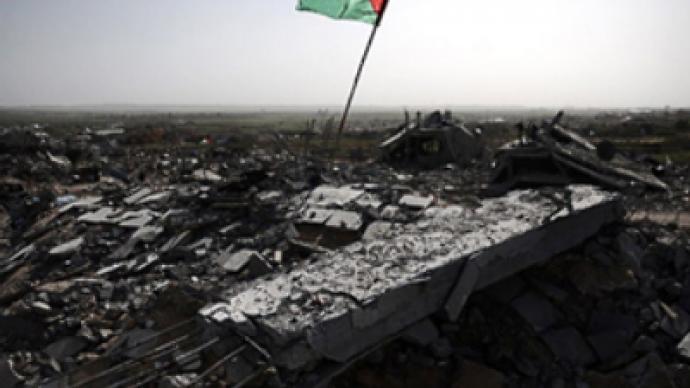Other nations join in siege of Gaza

Hamas’ efforts to break the Israeli siege of the Gaza Strip by firing rockets into Israel not only triggered this month’s Israeli air and ground attack, but has also led to an even tighter siege.
Other nations have joined with Israel in containing the militant Islamic movement Hamas. The deployment of a French frigate in the waters off Gaza this week with orders to block arms smuggling to Hamas drew expressions of dismay from the Islamic movement’s leaders. “We expected France to send hospital ships to treat the children burned by banned weapons or to set up a humanitarian bridge,” said Hamas Prime Minister Ismail Haniya in a statement, “rather than deploy a navy ship to reinforce (Israel’s) blockade.” Some 1,200 Palestinian civilians and militiamen were killed in the fighting and thousands reported wounded.
Britain and Germany have also offered to send naval vessels to the Middle East to help prevent arms smuggling into Gaza. Their announcements came after Washington, in the closing days of the Bush administration, pledged in a memorandum of understanding with Israel to track arms shipments headed from Iran to Gaza via East African countries and Egypt’s Sinai desert. Early last week an American naval vessel in the Red Sea searched a cargo vessel, Iranian-owned but flying a Cypriot flag, and found a shipment of artillery shells. It was unclear if there was a Gaza connection. Israel is concerned that Iran will attempt to renew Hamas' rocket arsenal and upgrade it with rockets capable of hitting the centre of the country.
Hamas could have expected sympathy at least from the European Union’s foreign aid chief, Louis Michel, who toured the battered coastal strip on Monday and viewed close-up the remains of the 4,000 homes and 100 government office buildings, police stations and mosques destroyed by the Israeli attack. However, while still in Gaza, Michel told reporters that Hamas had acted like “a terrorist movement” and bore “enormous responsibility” for the devastation. Accusing Hamas of using civilians as human shields by fighting in populated areas, he said that its years-long firing of rockets into Israel was a “provocation” that led to the recent war.
Michel also accused Israel of wantonly destroying factories and other economic infrastructure. “What I saw was abominable,” he said, but it was his criticism of Hamas which resonated. “It is shocking,” responded Hamas official Mushir al-Masri, “to see a European official giving cover to massacres and terrorism committed by the Zionist enemy against the Palestinian people. Palestinian resistance is as legitimate as the resistance of European countries that fought against foreign occupiers.”
Even more galling for Hamas is the lack of support, indeed outright hostility, it has encountered from neighbouring Egypt, the largest and most important country in the Arab world. Cairo has been highly critical of Hamas’ militancy and has refused to open its border crossing with Gaza in order to permit supplies to reach the strip from an Arab country, rather than through the crossing points from Israel. Egypt has been attempting to persuade Hamas to form a unified Palestinian government with the Palestinian Authority in the West Bank but Hamas has been reluctant.
Israel says it will keep its crossings to Gaza closed, except for humanitarian supplies, unless Hamas agrees to free Cpl. Gilad Shalit, who has been in Hamas captivity for three years.
Adding to the strain on the Hamas leadership was a warning on Monday by Israeli Transport Minister Shaul Mofaz, a former defense minister, that Prime Minister Haniya, who went into hiding when the war started, would not be able to emerge from his hiding place to see the light of day, for fear of assassination, until Shalit is freed.
Abraham Rabinovich for RT












